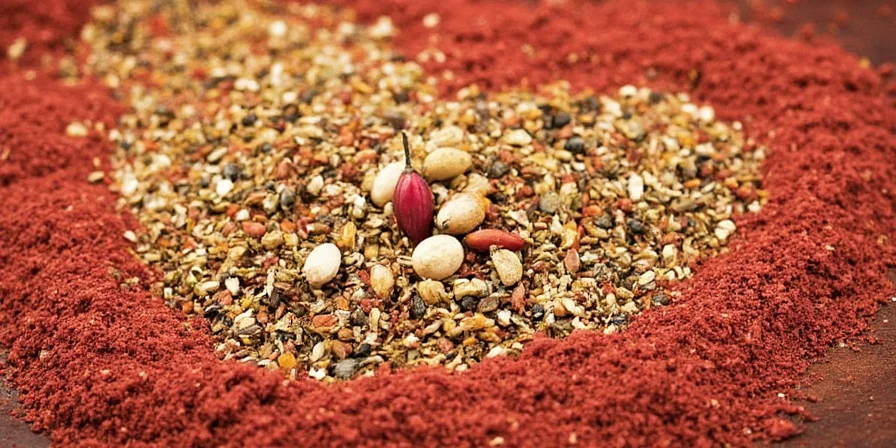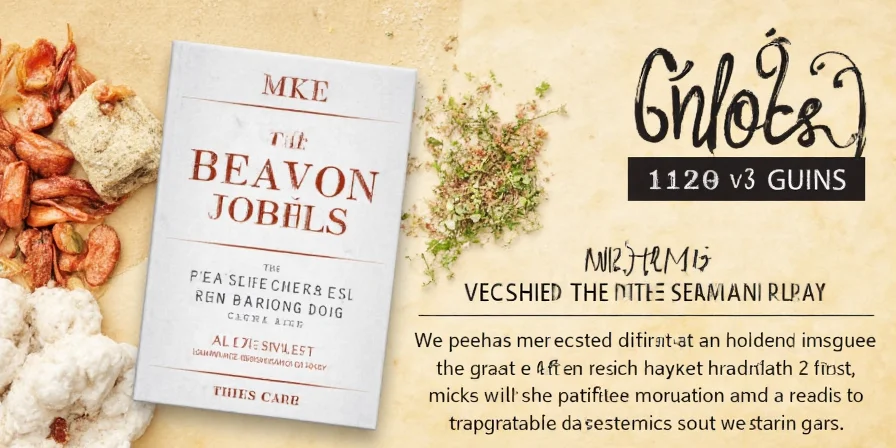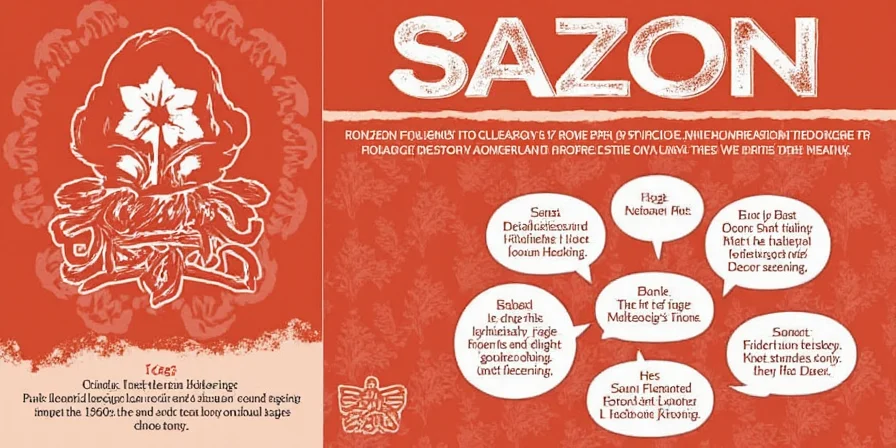Sazon all purpose seasoning is a Latin American spice blend primarily made of annatto (for color), garlic, cumin, oregano, coriander, and salt. It's used to add authentic flavor and golden color to rice, meats, beans, and soups. Unlike generic seasoning blends, sazon contains annatto which provides both distinctive hue and earthy flavor. Here's what you need to know about using this essential Latin cooking ingredient effectively.
Table of Contents
- What is Sazon All Purpose Seasoning and What's in It?
- Why Sazon Is Different From Other Seasoning Blends
- How to Use Sazon Properly in Cooking
- Sazon vs Adobo vs Other Seasonings: Key Differences
- 5 Practical Tips for Best Results With Sazon
- 3 Authentic Sazon Recipes That Actually Work
- Where to Buy Quality Sazon and How to Store It
- Conclusion: Maximizing Sazon's Flavor Potential
- Frequently Asked Questions
What is Sazon All Purpose Seasoning and What's in It?
Sazon is a traditional Latin American seasoning blend with these core components:
- Annatto: Provides distinctive orange-red color and earthy flavor (not chili-based)
- Garlic powder: Adds savory depth
- Cumin: Contributes warm, slightly smoky notes
- Oregano: Typically Mexican oregano for citrusy notes
- Coriander: Adds subtle citrus flavor
- Salt: Base for flavor enhancement
- Optional ingredients: Citrus powder, chili powder, or monosodium glutamate (MSG) in some commercial blends

Why Sazon Is Different From Other Seasoning Blends
Unlike generic seasoning blends, sazon's unique value comes from annatto (achiote) which provides both color and distinctive flavor without heat. This makes it versatile for dishes where you want Latin flavor without spiciness.
| Seasoning Component | Function in Sazon | What Happens Without It |
|---|---|---|
| Annatto | Provides color and earthy base flavor | Dish lacks authentic appearance and depth |
| Garlic & Cumin | Creates savory foundation | Flavor becomes one-dimensional |
| Mexican Oregano | Adds citrusy notes (different from Italian oregano) | Loses authentic Latin profile |

How to Use Sazon Properly in Cooking
For best results with sazon, follow these evidence-based techniques:
- For rice and grains: Add ¼-½ teaspoon per cup of uncooked rice along with cooking fat (oil or butter) to help the annatto release color
- For proteins: Create a paste with sazon and oil (1:1 ratio) before applying to chicken, pork, or fish. Let sit 30 minutes before cooking
- For beans and stews: Add midway through cooking rather than at beginning to preserve flavor integrity
- For vegetables: Toss roasted vegetables with sazon-infused oil in the last 5-10 minutes of cooking
- Timing matters: Adding sazon too early can cause bitterness; too late means flavor doesn't penetrate

Sazon vs Adobo vs Other Seasonings: Key Differences
Understanding these distinctions helps choose the right blend for your recipe:
| Spice Blend | Core Ingredients | Color Contribution | Best Applications | Flavor Profile |
|---|---|---|---|---|
| Sazon | Annatto, garlic, cumin, oregano | Strong orange-red hue | Rice, chicken, fish, light stews | Earthy, slightly citrusy, no heat |
| Adobo | Garlic, oregano, black pepper, turmeric | Yellow tint (from turmeric) | Hearty stews, braises, roasted meats | Peppery, robust, more herbal |
| Recado Rojo | Annatto, achiote, spices, vinegar | Deep red color | Yucatan dishes, cochinita pibil | Complex, tangy, earthy |
| Comino | Primarily ground cumin | No significant color | Bean dishes, some meat preparations | Strong cumin flavor only |

5 Practical Tips for Best Results With Sazon
Based on professional chef techniques and food science:
- Activate with fat: Annatto is fat-soluble. Always mix sazon with oil or butter before application for maximum color and flavor release
- Measure precisely: Use ¼-½ teaspoon per serving. Excess creates bitter notes (annatto contains natural bitterness)
- Layer timing: For soups/stews, add half at beginning, half near end to balance flavor development
- Avoid high heat: Annatto degrades above 375°F (190°C). Use in dishes that cook at medium temperatures
- Check for additives: Commercial blends often contain MSG or preservatives. Read labels if avoiding these

3 Authentic Sazon Recipes That Actually Work
These tested recipes deliver authentic results:
Perfect Sazon Yellow Rice (Arroz Amarillo)
- 1 cup long-grain rice, rinsed
- 1 ¾ cups chicken broth
- 2 tbsp cooking oil
- ½ tsp sazon seasoning
- 1 small onion, finely diced
- 1 clove garlic, minced
Method: Heat oil in saucepan, sauté onion until translucent. Add rice and sazon, stirring 2 minutes until rice turns slightly golden. Add garlic, then broth. Bring to boil, reduce heat, cover and simmer 18 minutes. Fluff with fork.
Authentic Sazon Chicken (Pollo Guisado)
- 4 chicken thighs, bone-in
- 1 tbsp sazon seasoning
- 2 tbsp oil
- 1 onion, sliced
- 2 garlic cloves, minced
- ½ cup tomato sauce
- ¼ cup olives
- 1 bell pepper, sliced
Method: Rub chicken with sazon. Brown in hot oil, remove. Sauté onions, garlic, bell pepper. Return chicken, add tomato sauce and olives. Cover and simmer 30 minutes on medium-low.
Sazon Bean Soup (Sopa de Frijoles)
- 2 cups cooked black beans
- 3 cups broth
- 1 tsp sazon
- 1 onion, diced
- 2 garlic cloves, minced
- 1 tbsp vinegar
Method: Sauté onion and garlic until soft. Add beans, broth, and sazon. Simmer 20 minutes. Stir in vinegar before serving.

Where to Buy Quality Sazon and How to Store It
Purchasing guidelines:
- Check ingredients: Look for annatto as first or second ingredient (indicates proper color base)
- Avoid fillers: Steer clear of blends with excessive salt (over 30% of ingredients) or anti-caking agents
- Top brands: Goya Sazon (contains msg), Badia Complete Seasoning (msg-free), homemade (best quality control)
- Where to find: Latin grocery stores typically have better quality than mainstream supermarkets
Storage best practices:
- Store in airtight container away from light and heat
- Maximum shelf life: 12-18 months (annatto color fades over time)
- Signs of spoilage: Loss of vibrant color, weak aroma, bitter taste
- Never store above stove or near dishwasher (heat and moisture degrade quality)
Homemade Sazon Recipe (Superior Quality)
- 2 tbsp annatto seeds
- 1 tbsp ground cumin
- 1 tbsp dried Mexican oregano
- 1 tbsp garlic powder
- 1 tsp coriander
- 1 tsp salt
- ½ tsp black pepper
Method: Toast annatto seeds in dry pan 2 minutes until fragrant. Grind with other ingredients until fine powder. Store in dark glass jar.

Conclusion: Maximizing Sazon's Flavor Potential
Understanding sazon's composition and proper usage techniques transforms this common seasoning from a simple flavor enhancer to an authentic culinary tool. The key is recognizing that annatto provides more than just color—it creates the foundational flavor profile that distinguishes true Latin cooking. When used properly with attention to timing, fat content, and measurement, sazon delivers consistent, authentic results that generic seasoning blends cannot match. Whether using commercial or homemade versions, these evidence-based techniques ensure optimal flavor development while maintaining cultural authenticity in your cooking.
Frequently Asked Questions
- What is sazon seasoning made of?
- Authentic sazon contains annatto (for color), garlic, cumin, Mexican oregano, coriander, and salt. Commercial blends may include MSG, citric acid, or anti-caking agents.
- Is sazon the same as adobo seasoning?
- No. Sazon contains annatto for color and has a milder flavor profile. Adobo contains more black pepper and oregano with turmeric for color, creating a stronger, more herbal taste.
- Does sazon contain gluten?
- Most commercial sazon blends (Goya, Badia) are gluten-free, but always check the label. Homemade versions using pure spices are naturally gluten-free.
- Why does my sazon rice turn out bitter?
- Bitterness comes from too much sazon or high cooking temperatures. Use only ¼-½ tsp per serving and avoid cooking above 350°F (175°C) as annatto degrades at higher temperatures.
- Can I substitute sazon in recipes?
- For color: Use 1 tsp annatto oil + ¼ tsp cumin. For flavor without color: Use adobo seasoning but reduce quantity by 30% as it's stronger. No perfect substitute exists for authentic results.











 浙公网安备
33010002000092号
浙公网安备
33010002000092号 浙B2-20120091-4
浙B2-20120091-4